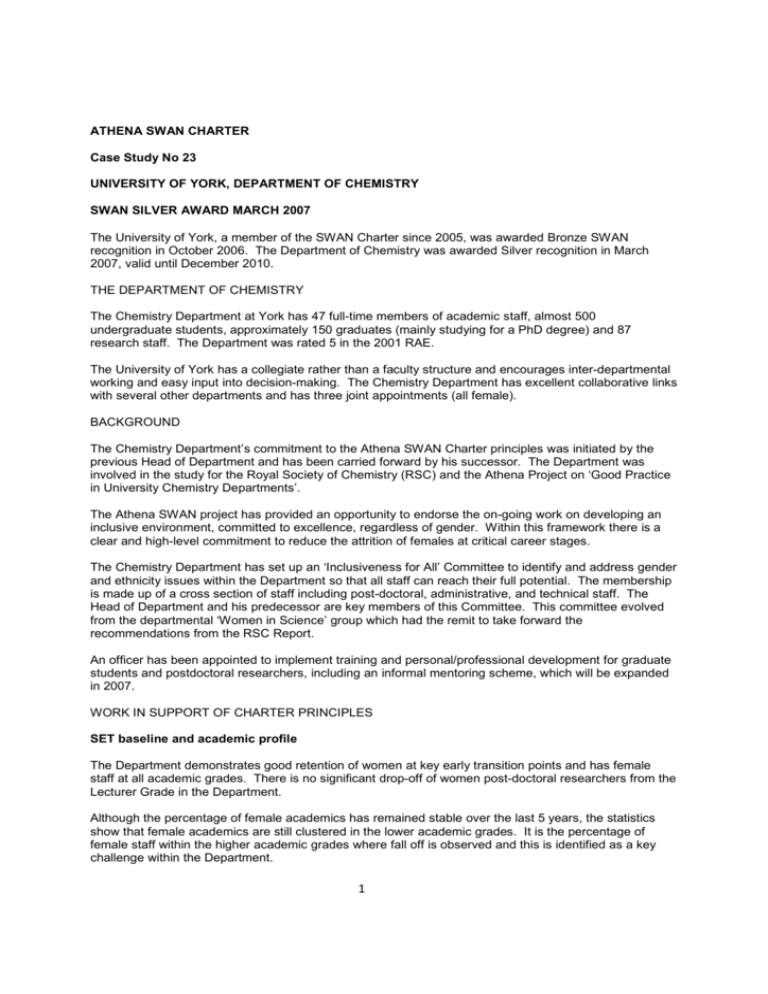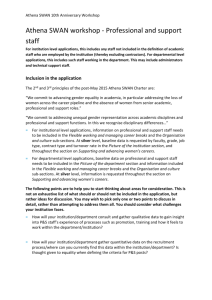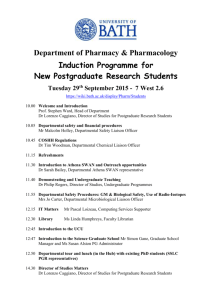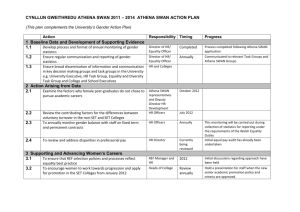No 23 York University Chemistry Department
advertisement

ATHENA SWAN CHARTER Case Study No 23 UNIVERSITY OF YORK, DEPARTMENT OF CHEMISTRY SWAN SILVER AWARD MARCH 2007 The University of York, a member of the SWAN Charter since 2005, was awarded Bronze SWAN recognition in October 2006. The Department of Chemistry was awarded Silver recognition in March 2007, valid until December 2010. THE DEPARTMENT OF CHEMISTRY The Chemistry Department at York has 47 full-time members of academic staff, almost 500 undergraduate students, approximately 150 graduates (mainly studying for a PhD degree) and 87 research staff. The Department was rated 5 in the 2001 RAE. The University of York has a collegiate rather than a faculty structure and encourages inter-departmental working and easy input into decision-making. The Chemistry Department has excellent collaborative links with several other departments and has three joint appointments (all female). BACKGROUND The Chemistry Department’s commitment to the Athena SWAN Charter principles was initiated by the previous Head of Department and has been carried forward by his successor. The Department was involved in the study for the Royal Society of Chemistry (RSC) and the Athena Project on ‘Good Practice in University Chemistry Departments’. The Athena SWAN project has provided an opportunity to endorse the on-going work on developing an inclusive environment, committed to excellence, regardless of gender. Within this framework there is a clear and high-level commitment to reduce the attrition of females at critical career stages. The Chemistry Department has set up an ‘Inclusiveness for All’ Committee to identify and address gender and ethnicity issues within the Department so that all staff can reach their full potential. The membership is made up of a cross section of staff including post-doctoral, administrative, and technical staff. The Head of Department and his predecessor are key members of this Committee. This committee evolved from the departmental ‘Women in Science’ group which had the remit to take forward the recommendations from the RSC Report. An officer has been appointed to implement training and personal/professional development for graduate students and postdoctoral researchers, including an informal mentoring scheme, which will be expanded in 2007. WORK IN SUPPORT OF CHARTER PRINCIPLES SET baseline and academic profile The Department demonstrates good retention of women at key early transition points and has female staff at all academic grades. There is no significant drop-off of women post-doctoral researchers from the Lecturer Grade in the Department. Although the percentage of female academics has remained stable over the last 5 years, the statistics show that female academics are still clustered in the lower academic grades. It is the percentage of female staff within the higher academic grades where fall off is observed and this is identified as a key challenge within the Department. 1 The Department encourages collaboration on joint research grants and studentships between junior female academic staff and more senior colleagues. For externally advertised academic appointments, potential female candidates are always identified and encouraged to apply for the vacant position. The job advertisement emphasises the Department’s family friendly policies. All interview panels are of mixed gender, containing at least one female academic (from the Chemistry Department or another University Department). In recognition that women are more likely to favour interdisciplinary working than men, a number of Doctoral Training Account studentships (funded by Research Councils to support PhD students) have been given to high quality collaborative research projects. In the last 5 years 18% of these have been held by women working with another female colleague and another 18% by women working with male colleagues. An Outreach Coordinator provides a visible female role model in schools and helps to keep the percentage of female undergraduates at a consistent level. Key career transition points The Department operates a transparent promotions policy, running seminars (to outline requirements and routes to promotion) and actively encouraging those who may be reluctant to put themselves forward. Support is also provided via constructive criticism of draft promotion CVs from a designated ‘Champion’ on the Departmental Personnel Committee. The Department has appointed a Graduate and Post-doctoral Training Officer to support postgraduate students and post-doctoral researchers with a range of career and professional development advice and opportunities. The aim is to address the negative impact of short-term contracts and to tackle some of the obstacles in making the transition from PhD into a sustainable academic career. The Training Officer has written a document outlining the roles and responsibilities of contract researchers and Principal Investigators (PIs) in the Department. She has also developed an informal mentoring (buddy) system for post-doctoral researchers. A formal Induction Programme supports new staff and there is a compulsory training programme in teaching for all academic staff at lecturer grade, essential to meet probation criteria. All new academic staff, regardless of age, are offered a Departmental mentor to provide support and career advice in the early years of their academic career. Culture Change and gender balance in decision-making There is female membership on all the Department’s key decision-making committees, encompassing staff at all academic grades, not just at professorial level, and the membership changes regularly. The Finance Group is chaired by a female member of staff. Membership of key committees is known to all staff and is for a fixed term. Information is disseminated to all staff via a Departmental website and a web-based newsletter. Administration and Teaching loads are also published on the website ensuring open and transparent management of the Department. The Department eschews the ‘competitive culture’, valuing quality over quantity in terms of research output. Quality at all levels is visibly celebrated, whether in reports on the website or in more active celebrations, such as dinners. The Department celebrates teaching excellence with an annual prize, won in 2006 by a woman. Work/life balance practices The Department operates flexible-working practices at all levels, including annualized hours and part-time 2 working. The Department schedules meetings and seminars within the 9am – 5pm timeframe. Champions, responsibilities and accountabilities The Department recognises that role models (both male and female) at all levels act as a key factor in increasing the representation and retention of women in Chemistry. A conscious effort is made to invite female chemists as external speakers for Departmental seminars. The Department regularly publicises the achievements of women in the Departmental newsletter, the University Magazine and in annual reports. All UCAS applicants to the Department of Chemistry are interviewed, ideally with female members of academic staff interviewing female candidates. The Department has appointed two female external examiners for the Undergraduate degree course. THE SELF-ASSESSMENT PROCESS A Departmental Working Group of 6 was set up, including the Head of Department who also sits on the University of York’s Athena SWAN Working Group. The Working Group’s aims were to: • • • • • • Identify the Departmental initiatives which support Charter principles and to evaluate their success or otherwise Identify the key data/statistics needed for the self-assessment process Identify and implement dissemination of the Athena SWAN process within the Department Formulate a strategy/timetable towards submission Evaluate the data/statistics collected, identify key barriers Formulate new initiatives The group met on a regular basis and all members of staff (academic and non-academic) were consulted on the Athena SWAN process via an open Departmental meeting held in October 2006. The Action Plan which emerged from the submission process has been endorsed by the Head of Department and by the Pro Vice Chancellor for Research. DEVELOPING THE ACTION AGENDA The Department identified two key targets for improvement: • • Attaining parity between male and female undergraduate and postgraduate numbers The promotion of female academic staff to the higher academic grades. The Self Assessment Group has proposed a series of measures to address these points. THE PLAN SET Baseline and academic profile • • • Presentation of key indicators and data annually to Departmental Personnel Committee and regularly to HoD advisory group for review. Develop further mentoring schemes in 2007 Hold a Women in Science awareness session in early 2007 with the RSC Key career transition points • • Establish a returners policy and promote greater awareness of returners fellowships Highlight successful role models 3 • • • Improve communication and awareness of promotions criteria and take more pro-active approach to promoting staff, identifying and encouraging female candidates to apply for positions Using similar methods, increase the numbers moving into academia and translate those increased numbers through the higher academic grades In 2007 develop a perception questionnaire for women postgraduates and PDRAs about a career in academia and what barriers they see Culture change • • • • • • • Analysis of Nov 2006 Information Survey results Effective dissemination of information to all cohorts of staff including PDRAs Invite women chemist prize winners, eg, Rosalind Franklin award to give seminars and be long-term visitors Continue open management of the Department with change in Head of Department in 2008 Develop web pages on women in science and review departmental web pages for gender balance Continue high involvement of female staff on all key committees Continue female membership of external examining panel and expand to increase the number of female postgraduate examiners Work life balance • • • • Further promotion and uptake of flexible working patterns within the Department in 2007 Pilot flexitime in 2007 Ensure more flexible scheduling of meetings to take account of flexible working patterns Establish more inclusive departmental social activities and involve families more Champion and responsibilities • • • • • • Greater awareness in the performance review system of different pathways up the academic grades Establish career developmental mentoring for women researchers for both academic and industrial careers Department to be fully involved in university led women’s mentoring schemes Involve more women as independent panel members on thesis advisory panels Encourage female staff to contribute more to internal and university publications Head of Department to continue as a member of Athena SWAN Working Group and to report regularly to staff on Athena SWAN and other gender/ethnicity issues within the Department 4



